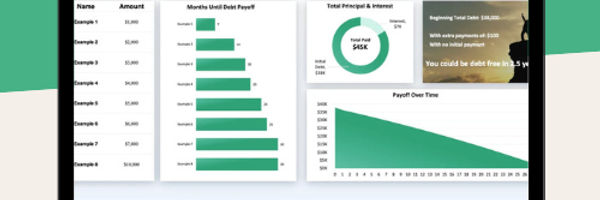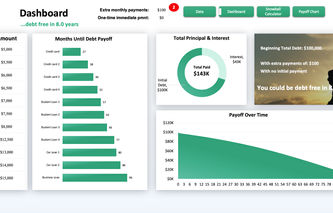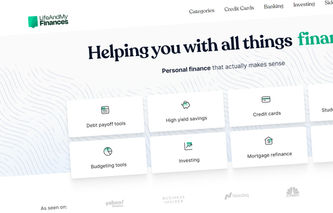I graduated with my bachelor’s in finance in 2008 when the banks were shutting down. My first full-time job paid me just $33,000 a year. And I got married and divorced by the age of 27. I didn’t do most things right—but I still achieved a debt-free life by age 30. And you can too.
This article will show you:
What it really means to be debt-free.
How I achieved a debt-free life, and how you can too.
The benefits and disadvantages of becoming debt-free.
Read more:
What does being debt-free mean?
I am debt-free.
I was consumer debt-free by 28 years old and completely debt-free at 29.
So for starters, what do these two terms actually mean?
Consumer debt freedom
My golf buddy and I were chatting on the course the other day.
Naturally, the conversation moved toward personal finance and debt (I just can’t help myself), and he mentioned he was debt-free.
Cool. Good for him, right?
Then, just a few minutes later, he was talking about his car loan and student loan.
Wait, what?
Dude, this is debt. Apparently, he didn’t know.
So what is consumer debt?
Consumer debt is any loan that’s not your mortgage or business debt.
This includes:
Medical debt
Car loans
Student loans
Personal loans
Even if you think your loans are “good debt,” it’s still debt.
If you get rid of all your debt outside of your house and business, you are considered consumer debt-free.
Is a mortgage debt?
Yes, a mortgage loan is certainly debt. You borrowed money with the agreement to pay it back, after all.
But it’s not consumer debt, so it often gets its own category.
Complete debt freedom
What is complete debt freedom?
As the name implies, this is when you’re totally debt-free, including your house and business.
You don’t owe anyone a single penny, and all the cash you earn goes straight to you and stays with you.
The Case For Living Debt-Free
I’ve been living debt-free for nearly a decade now.
What does it feel like? What are the benefits of being debt-free? Is it worth it?
And what about the disadvantages of being debt-free? Are there any?
Believe it or not, yes. (Even I can admit that, and I’m a hardcore get-out-of-debt guy.)
Let’s dive into each side—
Pros
You can save money on interest. That’s because you don’t have to pay any.
You’re a lot less stressed out. You no longer have payments to worry about every month.
You have more cash to save, invest, and have fun. I was shocked at how quickly our bank account grew when we got out of debt. You’ll have tens of thousands of dollars before you know it.
You feel more confident at work. You’re not as worried about losing your job. You’ll speak up more and make a bigger impact when you’re financially secure.
You have more freedom to do what you love in life. When you’re not a slave to debt and have huge savings, you can afford to take risks and follow your passions.
You can retire early. That’s because of your low monthly expenses.
You can improve your credit score. Your utilization drops and you can easily pay your credit cards in full each month.
Cons
You become unrelatable to most. When you’re debt-free, you’ll view things differently. And when people discover that you’ve paid off all your debt, they won’t want to tell you about their dumb financial choices anymore. So you might lose some friendships along the way.
You won’t own a mammoth house like your friends. I own a modest 1,900-square-foot house. My friends earn less than me and live in brand-new houses of over 3,000 square feet. I sometimes envy them but then realize they’ll be in debt for the next 25 years.
You’re not leveraging your money. Instead of being debt-free and owning one rental property, you could put a 10% down payment on ten and boost your earning potential. But this also comes with increased risk and hassle.
Is being debt-free worth it?
I achieved complete debt freedom before the age of 30.
And—to give you all hope—I achieved this with a very modest income (far below six figures).
Was it worth the sacrifice?
Let me paint you a picture of where I am—personally and financially. Then you can decide for yourself if being debt-free is worth it:
I’m married with two wonderful children.
We have no debt and live on wooded acreage near our local lake.
With no debts, we have thousands of excess dollars a month.
We have funds available to put our kids through private school and college.
We have hundreds of thousands of dollars in our retirement accounts, which will likely grow to $2+ million by our mid-sixties (without us having to add another dime).
I used to work in corporate as a financial analyst. Now, with our financial stability, I’m working on my passion—this personal finance website (so I can help all of you get to where I am and beyond).
I hesitate to share all of this information since I’m really not the type to boast or flash my cash around the neighborhood. That’s just not me.
But I think this might sell you on the idea of debt freedom. It’s just amazing how fast you can save up money if you get out of debt early in life.
So is it worth it? I believe absolutely, yes.
Would I do it again? A hundred percent.
How to Become Debt-Free
How did I get completely out of debt before the age of 30? And how can you do it too?
There are three main emotions that drive you to do something different than you’re doing today:
Greed
Fear
Anger
If you want to get out of debt, you either aspire to be wealthy, you’re afraid of not being able to pay the bills, or you’re downright angry at your debt or situation.
If any of these emotions describe you, great. You’re ready to pay off your debts.
So what do you do now? How do you get started?
Steps to becoming debt-free
There are many detailed steps and tips I could give you here—we outline nearly all of them in our recent post, “40+ Tips to Get Out of Debt Fast”—but for this post, we’ll limit it to the biggies:
1. Lay out all your debts and make a plan
If you don’t know what your debts are, you’ll have no chance of paying them all off.
Step one is to list your debts. I’d recommend entering them into our debt snowball calculator.

Time to get out of debt with this debt snowball worksheet! 💪
As seen on CNBC and Business Insider, this is the best debt snowball spreadsheet template for Microsoft Excel and Google Sheets that is out there!
A few key features of this template:
It will show you when you can pay off your debt
Detailed but super easy and suitable for beginners
Can handle up to 32 debts!

In the calculator, not only can you see how long it would take you to get out of debt by making the minimum payments, but you can also enter extra payments and see what impact they would have on your debt-free journey.
With this, you can make a debt payoff plan in minutes.
2. Save up $2,000 to $3,000
Before you wage war on your debts, though, be sure to first save up a little savings account.
This will keep you from going back into debt when emergencies pop up.
3. Cut back on expenses
If you really want to live debt-free someday, you’ll have to cut back on expenses.
To make the biggest impact, look at your biggest spending categories—likely your home, cars, and food.
4. Increase your income
The other way to speed up your debt payoff journey is to boost your income.
The best ways to do this are to ask for a raise, get a promotion, switch to a new job with another company, or build up a lucrative side hustle.
5. Go FAST
Going slow is painful, and you’ll likely quit.
If you want to get out of debt, it’s best to just rip off the band-aid and get after it.
How to Maintain a Debt-Free Lifestyle
Some people are so set on paying off their debt that when they finally reach their goals, they say, “I’m debt-free. Now what?”
It can be confusing after having such a clear direction up to that moment.
So, once you become debt-free, what do you do from there? Do you take a world trip and buy everything you’ve always wanted?
Sorry, it doesn’t work that way.
If you want to stay debt-free and continue to grow your wealth, you’ll want to:
Keep your expenses low.
Build up a full six-month emergency fund (at minimum).
Invest at least 15% of your income toward retirement.
Stay in your modest home, drive your modest cars, and take modest trips. This will enable you to stay out of debt and save aggressively for your future, allowing you to retire early or become incredibly generous with your wealth later in life.
Characteristics of People Who Are Debt-Free
Debt-free people all have a certain persona.
They’re different. But in what way?
What are the characteristics of people who have ditched their debt and aren’t looking back?
They don’t care what other people think of them.
They’re incredibly disciplined.
They set goals.
They’re forward-thinking.
They aren’t afraid to say no.
Stuff doesn’t define them.
And they don’t blame others if something goes wrong. They take responsibility and fight to make their situation better.
Is a Debt-Free Lifestyle Possible For You?
So what about you? Can you have zero debt and live the carefree life you’ve always dreamed of?
Absolutely.
Remember!
All it takes is determination and the willingness to open yourself up to what’s possible. Stop listening to the naysayers and start thinking about how you could achieve your debt-free goals.
You’ll be shocked at how this simple mental flip can change everything.
Start Your Debt-Free Journey Today
There’s nothing left to analyze or consider—
If you want to be wealthy in the future, it’s best to get out of debt today.
Are you ready?
If you are, I’d suggest starting with our debt snowball tool.

Time to get out of debt with this debt snowball worksheet! 💪
As seen on CNBC and Business Insider, this is the best debt snowball spreadsheet template for Microsoft Excel and Google Sheets that is out there!
A few key features of this template:
It will show you when you can pay off your debt
Detailed but super easy and suitable for beginners
Can handle up to 32 debts!

The smallest one holds up to eight debts and is totally free. If you have more debts than that, you can get our largest tool (and it’s still less than $10).
If you really want to push it and get as much get-out-of-debt information as possible, check out our “Get Out of Debt Fast” course. It comes with a ton of extras and costs much less than you’d think.
Key Takeaways
Being debt-free is awesome. I became debt-free ten years ago—and I don’t regret it one bit. There are certainly more pros than cons.
To become debt-free, you’ll need to be okay with being weird, you’ll need to be disciplined, and you can’t be afraid to say no.
Debt freedom is possible for anyone. They just need to be willing to work hard, open their mind, and start sooner rather than later.
FAQ
What does debt-free mean?
Is it possible to live debt-free?
What are some tips on how to live a debt-free life?
At what age should you be debt-free?
What percentage of people live deb-tfree?
What do you do once you're debt free?
Can you use life insurance to pay off debt?
What are some disadvantages of being debt-free?
Sources
By. (2023, February 24). Average Consumer Debt Levels Increase in 2022 - Experian. https://www.experian.com/blogs/ask-experian/research/consumer-debt-study/


.jpg)



